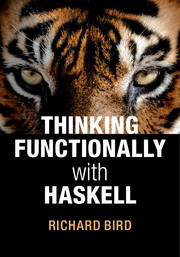Preface
Published online by Cambridge University Press: 05 November 2014
Summary
The present book is a completely rewritten version of the second edition of my Introduction to Functional Programming using Haskell (Prentice Hall). The main changes are: a reorganisation of some introductory material to reflect the needs of a one or two term lecture course; a fresh set of case studies; and a collection of over 100 exercises that now actually contain answers. As before, no knowledge of computers or programming is assumed, so the material is suitable as a first course in computing.
Every author has his or her own drum to beat when writing a textbook, and the present one is no different. While there are now numerous books, tutorials, articles and blogs devoted to Haskell, few of them emphasise what seems to me the main reason why functional programming is the best thing since sliced bread: the ability to think mathematically about functional programs. And the mathematics involved is neither new nor difficult. Any student who has come to grips with, say, high-school trigonometry and has applied simple trigonometric laws and identities to simplify expressions involving sines and cosines (a typical example: express sin 3α in terms of sin α) will quickly appreciate that a similar activity is being proposed for programming problems. And the payoff is there at the terminal: faster computations.
Information
- Type
- Chapter
- Information
- Thinking Functionally with Haskell , pp. ix - xiiPublisher: Cambridge University PressPrint publication year: 2014
